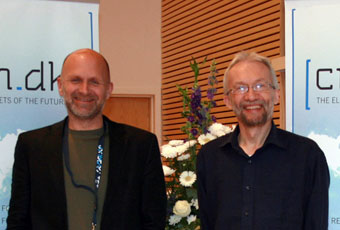Research centre to develop state-of-the-art e-market solutions
PRESS RELEASE: In the coming six years economists and computer scientists will cooperate on developing new state-of-the-art e-market solutions. The project Foundations of Electronic Markets, CFEM, is funded with 26.5 million Danish Kroner (4.75 million USD) by the Danish Council for Strategic Research.

– Electronic commerce is developing rapidly, explains leader of the project, Ivan Damgaard, professor at the Department of Computer Science, Aarhus University. Not only in e-shopping and online auctions but also in more advanced forms of commerce.
Google, for instance, carries out millions of auctions every single day: each time a user gets a search result, a number of sponsored links are shown at the right side of the screen. Their sequence and price are determined by a special type of auction: advertisers do not pay their own bid price but that of the following bidder.
New electronic marketplaces
The example from Google shows that the technology opens new trading possibilities, according to Ivan Damgaard. And we will be able to design markets where sellers and buyers meet in new ways that ensure optimal price formation and eliminate price-raising intermediaries. Many organizations have shown an interest in these new opportunities. In addition to a number of research institutions, DONG Energy and Energinet.dk participate in the CFEM project as the technology developed in the project can be used in e.g. auctions for raw materials and energy. The other industrial partners in the project are: Partisia Market Design, TradeExtions and Inno:vasion, all of which are experts in designing electronic markets.
Confidentiality
A core element of the CFEM project is confidentiality. Many public and private tenders require bidders to provide confidential information that they do not want to share with others.
– In traditional auctions, bidders submit their bids to a so-called “trusted third party” who has access to all inputs – including those of competing bidders. Of course, this involves a risk of confidentiality violations, says Ivan Damgaard. We have developed a technology called Secure Multiparty Computation, SMC, which makes it possible to submit encrypted bids. The computer will then process the encrypted data and find a winner without ever revealing the encrypted information. In popular terms, it is possible to share a secret with others without disclosing it. By replacing the trusted third party with a secure electronic system, the risk of collusion and corruption during the bidding process can be eliminated.
Danish Competition and Comsumer Authority - DCCA
Another party in the project is the Danish Competition and Comsumer Authority - DCCA. The authority can use the system for market surveillance with the aim of monitoring that the players in the market play by the rules. When companies report data to DCCA in paper form, they are always hesitant as to how much to report because they never know who might read the papers. With the new system, companies can enter electronic data in encrypted form, after which the analysis can be performed.
It is also possible to use SMC for regulation. One of DCCA’s tasks is to regulate companies that are not subject to natural competition. This applies to for instance electricity and gas networks where there is usually only one provider in a given area. In those cases the tariffs are determined by benchmarking companies nationally or internationally. The more information you have, the better benchmarking. And when you can guarantee that the information remains secret, companies are willing to provide more information.
Economists and computer scientists cooperate
In the CFEM project economists and computer scientists will work closely together. Peter Bogetoft, professor at Copenhagen Business School (CBS), explains the background for this cooperation:
– For the past one or two decades, focus in economic theory has been on information. We have learned that a market or a negotiation is dependent upon who knows what and when. This also explains why secure multiparty computation has such a large potential in economic systems. With SMC we can control information in a completely precise and secure manner. This enables us to simply and securely realize many of the theoretical solutions that have been proposed over the years. Along with that, economists need the computer scientists for implementing practical solutions. Many trade situations are highly complex because they involve many companies and many types of commodities. This means that the computations behind the theoretical solutions can be extremely heavy and that efficient algorithms are needed. So it is essential to work together with accomplished operation analysts and computer scientists. This is for instance the case for combinatorial auctions where buyers focus on the combination of commodities they end up with, and therefore it is not optimal just to carry out a series of independent auctions.
The project Foundations of Electronic Markets starts in July 2010 and has a duration of six years.
